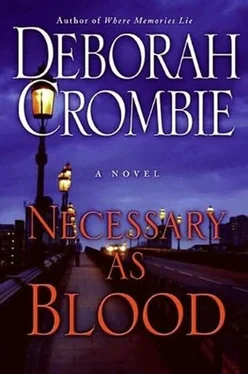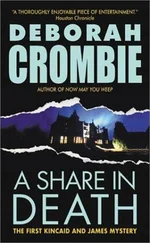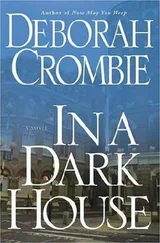The shorts and halter top Lou Phillips had changed into should have shown off her coloring, but Gemma thought her dark skin had a grayish tinge to it, and her bared shoulders were unflatteringly bony. Her dark hair was scraped up into a ponytail that lacked the élan of the one worn by her neighbor Michael.
“I’ve got the keys,” Phillips went on, without waiting for an answer. “If you’ll just make me a list of the items you take and return it with the-”
“Actually,” Gemma broke in, “I was hoping we could have a chat.”
Louise Phillips stared at her for a moment, then sighed. “All right. I suppose we can talk. But only if you like gin and tonic. And we’ll have to sit on the balcony. I can’t smoke in the flat, or Michael and Tam won’t let the dogs come in. Don’t want them exposed to secondhand smoke.” She rolled her eyes at this, but Gemma saw that there were two chairs on her side of the balcony, and an ashtray between them. “And they make me wash out the ashtray every day,” Louise grumbled as she led Gemma into the flat. Sotto voce, she added, “I cheat when it’s cold. I open the back window.”
“You’re not fooling anyone, Lou,” Michael called from the balcony, but his tone was affectionate. “We can smell it on the dogs’ coats.”
“Nazis,” Louise called back, but she smiled. “How Tam survives taking the bands to rock clubs, I don’t know. But now even those have been taken over by the no-smoking brigade.”
The flat was cluttered, apparently furnished with cast-off odds and ends, and most surfaces were covered with books and papers. The small kitchen at the back, however, was relatively neat, and Gemma suspected it was because Lou Phillips didn’t cook.
There was a lime on the cutting board, beside a tall glass and a bottle of Bombay gin and another of tonic. “Easy on the G for me,” said Gemma. “And heavy on the T. Have to drive.” She watched as Louise got another glass and filled both with ice, gin, and tonic, adding only a splash of gin to Gemma’s.
“Have you been here long?” Gemma asked. “It’s an interesting flat.” She accepted the drink Louise handed her. Tasting it, she found it delicious, the tartness of the lime and the bitterness of the tonic the perfect antidote to the heat.
“Ten-no, eleven years.” Louise was already pulling the cigarette packet from her shorts as they walked back through the flat. “I found it just a few months after Naz and I bought the practice.”
When they reached the patio, Louise sank into one chair, her cigarette already lit, while Gemma took the other. She saw that the ashtray was indeed clean.
Michael had gone inside the other flat, but the dogs remained, stretched out on the cool concrete, panting gently.
“Are you the green thumb?” Gemma asked, admiring the profusion of flowers and plants, only a few of which she recognized.
“Lord, no. That’s all Michael’s doing. He’s a floral designer, and living so close to Columbia Road is mecca for him. I kill everything I touch, and Tam’s not much better.”
“Did Michael know Sandra, then? From when she used to work the market with Roy Blakely?”
“Oh, Michael knew Sandra. But then it seems that everyone knew Sandra.” Louise exhaled a long stream of smoke and ground out her half-finished cigarette. “Sandra had a way of insinuating herself into people’s lives.”
“Insinuating?” Gemma asked, a bit puzzled by the word choice.
“I don’t mean that in a negative way. It was just that Sandra was interested in everything and everyone, and she made connections, and the connections made connections…”
Gemma thought about the unlikely-seeming thread between Sandra, and Azad, and Lucas Ritchie, and Pippa…and imagined those tendrils multiplied, exponentially. “How could someone who knew so much about everyone else reveal so little about herself?” she asked, as much to herself as to Louise. “No one I’ve talked to seems to know anything about Sandra’s background, or her relationship with her family-except maybe Roy Blakely, and that’s only because he’s known her family for years.”
“Naz knew enough,” Louise said flatly. Lighting another cigarette, she dropped the cheap plastic lighter. It rolled off the table to clatter onto the concrete, but Louise didn’t reach for it.
“What do you mean?” Gemma tried to keep the quickening of interest from her voice.
“And why does it matter to you?” The gaze Louise Phillips fixed on Gemma was sharp, a reminder that Phillips was, after all, a lawyer, and that, regardless of the gin and tonic, not much slipped past her.
“Because I care what happens to Charlotte,” Gemma said simply. “And I don’t believe that Sandra’s mother will provide a good-or safe-environment for her,” she added, thinking that such an understatement only touched the tip of the iceberg.
“Naz would have agreed with you.” Draining her gin and tonic, Louise placed her glass on the table with great deliberation. “And I let him down.”
Ahmed Azad didn’t blink. “Why should I be able to tell you anything about this Mr. Ritchie?”
“Because you belong to his club,” Kincaid answered.
“Ah.” Azad drew out the word, and his small smile conveyed no humor. “I see someone has been indiscreet. But no matter. It is no great secret, although some of my more-should we say, observant-brothers might be less than approving.”
“Was it Sandra Gilles who introduced you to Lucas Ritchie?”
“As a matter of fact, it was, yes. They were old friends, I believe, and Sandra thought our association might further my business interests.”
“And did it?” Kincaid asked, drinking more of his tea.
Azad glanced out at the restaurant and lifted his hand in an encompassing gesture. “It is always good to have connections. I could not run this restaurant strictly on the custom of Bangladeshis, and some of my…connections…have provided the occasional cash infusion. With a good return, I must say.”
“And yet you’ve had trouble with the white community, I understand, Mr. Azad. Vandalism, was it?”
“Do you call throwing rocks and gasoline bombs through the window ‘vandalism,’ Mr. Kincaid? Perhaps you do not take it any more seriously than did your colleagues?” Although Azad’s voice remained level, Kincaid sensed a deep-coursing anger.
He wondered what it took for this man to keep it buried when he socialized with the white, City types at the club in Widegate Street-men who had never known prejudice, never experienced the violence of a Molotov cocktail, never trembled in fear of a mob.
“I’m sorry the police weren’t more helpful, Mr. Azad,” he said genuinely. “Do you have any idea who might have been responsible?”
Azad looked at him for a long moment, then stood and walked over to one of the lush, green photographs on his office wall. Studying it, he said, “It is always our dream, Mr. Kincaid. To make our fortune here, then to go home to Sylhet as rich and respected elders, the envy of all our neighbors and relatives. But for most of us, it does not happen. Our lives are here. Our children’s lives are here. We do not want to make difficulties with those who become our friends, our associates.” He fell silent.
“You knew them,” Kincaid said quietly. “And you didn’t tell the police. Who were they, Mr. Azad?”
Azad didn’t turn. “I saw their faces. They had their hoods up, like the thugs they are. But still, I recognized them. Sandra Gilles’s brothers.”
Standing abruptly, Lou Phillips picked up her glass again and rattled the ice in it. “I’m going for a refill. Do you want another?”
Gemma shook her head. “No, thanks. I’m fine,” she said, but she stood as well and followed Louise back inside the flat. In the kitchen, as Louise broke a few more ice cubes from the tray and plunked them in her glass, Gemma asked, “What did you do, Louise? How did you let Naz down?”
Читать дальше












